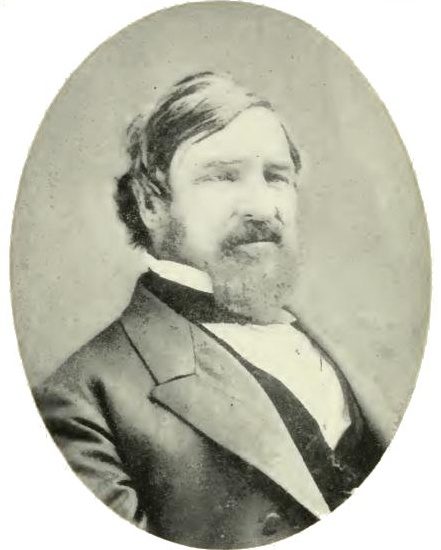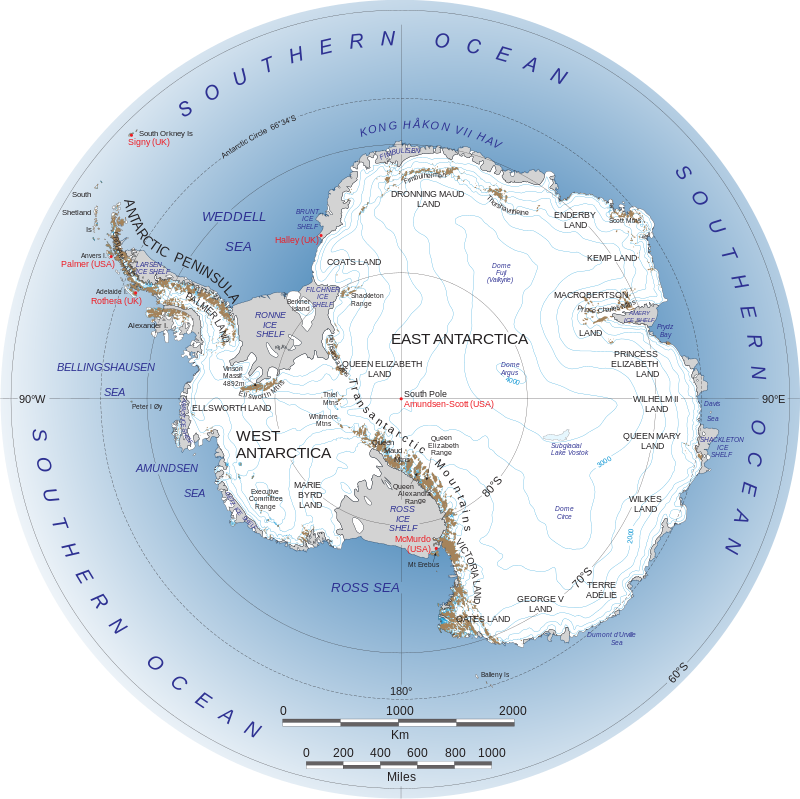By Zola Elder

FROM WIKIPEDIA COMMONS
Nathaniel Brown Palmer (August 8, 1799 – June 21, 1877) was an American seal hunter, explorer, sailing captain, and ship designer. He gave his name to Palmer Land, Antarctica, which he explored in 1820 on his sloop Hero. He was born in Stonington, Connecticut, and was a descendant of Walter Palmer, one of the town’s founders.

Antarctica (/ænˈtɑːrktɪkə/ ⓘ) is Earth‘s southernmost and least-populated continent. Situated almost entirely south of the Antarctic Circle and surrounded by the Southern Ocean (also known as the Antarctic Ocean), it contains the geographic South Pole. Antarctica is the fifth-largest continent, being about 40% larger than Europe, and has an area of 14,200,000 km2 (5,500,000 sq mi). Most of Antarctica is covered by the Antarctic ice sheet, with an average thickness of 1.9 km (1.2 mi).
Antarctica is, on average, the coldest, driest, and windiest of the continents, and it has the highest average elevation. It is mainly a polar desert, with annual precipitation of over 200 mm (8 in) along the coast and far less inland. About 70% of the world’s freshwater reserves are frozen in Antarctica, which, if melted, would raise global sea levels by almost 60 metres (200 ft). Antarctica holds the record for the lowest measured temperature on Earth, −89.2 °C (−128.6 °F). The coastal regions can reach temperatures over 10 °C (50 °F) in summer. Native species of animals include mites, nematodes, penguins, seals and tardigrades. Where vegetation occurs, it is mostly in the form of lichen or moss.
Antarctica is governed by about 30 countries, all of which are parties of the 1959 Antarctic Treaty System. According to the terms of the treaty, military activity, mining, nuclear explosions, and nuclear waste disposal are all prohibited in Antarctica. Tourism, fishing and research are the main human activities in and around Antarctica. During the summer months, about 5,000 people reside at research stations, a figure that drops to around 1,000 in the winter. Despite its remoteness, human activity has a significant impact on the continent via pollution, ozone depletion, and climate change.
TODAY’S ALMANAC
Question of the Day
Advice of the Day
Home Hint of the Day
Word of the Day
Puzzle of the Day
Born
- Carl Maria von Weber (composer) –
- Asa Gray (botanist) –
- Elizabeth Gilmer (journalist) –
- Clarence Day (author) –
- George Wald (chemist) –
- Imogene Coca (actress) –
- Alan Shepard, Jr. (astronaut) –
- Mickey Mouse (cartoon character) –
- Margaret Atwood (author) –
- Linda Evans (actress) –
- Elizabeth Perkins (actress) –
- Owen Wilson (actor) –
- David Ortiz (baseball player) –
Died
- Chester Arthur (21st U.S. president) –
- Marcel Proust (novelist) –
- Niels Bohr (physicist) –
- Joseph P. Kennedy, Sr. (patriarch of the Kennedy family) –
- Cab Calloway (bandleader) –
- Norma Connolly (actress) –
- James Coburn (actor) –
Events
- William Tell shot an apple off of his son’s head–
- Captain Nathaniel B. Palmer discovered Antarctica–
- Mark Twain’s, The Celebrated Jumping Frog of Calaveras County, was published–
- U.S. railroads adopted four standard time zones–
- Standard Railway Time went into effect for most North American railroads–
- The animated short, Steamboat Willie, was released featuring Mickey Mouse–
- Ben-Hur, the film epic starring Charlton Heston, premiered in N.Y.C.–
- The Chrysler Corporation announced the discontinuation of its DeSoto line of cars, in production since 1928–
- First commercial push-button telephone introduced, in Pennsylvania–
- Bill Watterson’s comic strip, Calvin and Hobbes, made its debut–
Weather
- 72 degrees F in Youngstown, Ohio–
- New York State received 6 to 16 inches of snow–
- Twenty inches of lake effect snow fell east of Cleveland, Ohio–
COURTESY www.almanac.com
